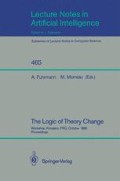Abstract
The purpose of this paper is to investigate the close relations between the logic of theory change (alias belief revision) on the one hand, and nonmonotonic logic on the other. The connection is most manifest at the level of general conditions on nonmonotonic inference operations, compared to those on theory revision operations. It also appears between some of the specific constructions that have been used in the literature to generate such operations.
After discussing the connection in intuitive terms, we express it as a formal translation procedure, and examine the outcome of translating well-known postulates and conditions from one domain to the other. On the level of specific constructions, we show the exact relationship, which is very close to identity, between the procedure of theory revision known as "full meet revision" and Poole's procedure for generating "default" inference operations.
Several illustrations are given of how results already known in one of the two domains throw light on the other domain, and also how they may suggest interesting open questions.
Preview
Unable to display preview. Download preview PDF.
References
Alchourrón, C.E., P. Gärdenfors, and D. Makinson (1985): "On the logic of theory change: Partial meet contraction and revision functions", The Journal of Symbolic Logic 50, 510–530.
Alchourrón, C.E. and D. Makinson (1982): "On the logic of theory change: Contraction functions and their associated revision functions", Theoria 48, 14–37.
Alchourrón, C.E. and D. Makinson (1985): "The logic of theory change: Safe contraction", Studia logica 44, 405–422.
Arló Costa, H. and R. Carnota (1989a): "Non monotonic preferential models and conditional logic", manuscript, Depto. de Filosofía, Univ. de Buenos Aires.
Arló Costa, H. and R. Carnota (1989b): "Non monotonic logics: Consequence relations and conditional operators", manuscript, Depto. de Filosofía, Univ. de Buenos Aires.
Fuhrmann, A. (1988): Relevant Logics, Modal Logics and Theory Change (Australian National University: Dept. of Philosophy and Automated Reasoning Project, RSSS).
Gärdenfors P. (1988): Knowledge in Flux: Modeling the Dynamics of Epistemic States (Cambridge, MA: The MIT Press, Bradford Books).
Gärdenfors, P. and D. Makinson. (1988): "Revisions of knowledge systems using epistemic entrenchment", in M. Vardi ed., Proceedings of the Second Conference on Theoretical Aspects of Reasoning about Knowledge. (Los Altos, CA: Morgan Kaufmann).
Ginsberg, M. (1986): "Counterfactuals", Artificial Intelligence 30, 35–79.
Hansson, S.O. (1989a): "New operators for theory change", Theoria 55, 114–136.
Hansson, S.O. (1989b): "A dyadic representation of belief", manuscript, Department of Philosophy, Uppsala University.
Kraus, S., D. Lehmann, and M. Magidor, (1990): "Nonmonotonic reasoning, preferential models and cumulative logics", to appear in Artificial Intelligence. A preliminary version appeared as Technical Report TR 88-15 of the Dept. of Computer Science, Hebrew University of Jerusalem, November 1988.
Lehmann, D. and M. Magidor (to appear): "Rational logics and their models: A study in cumulative logics". A preliminary version appeared as Technical Report TR 88-16 of the Dept. of Computer Science, Hebrew University of Jerusalem, November 1988.
Lewis, D. (1973): Counterfactuals (Oxford: Blackwell).
Lindström, S. and Rabinowicz, W. (1990): "Epistemic entrenchment with incomparabilities and relational belief revision", this volume.
Makinson, D. (1989): "General theory of cumulative inference", in M. Reinfrank, J. de Kleer, M.L. Ginsberg, and E. Sandewall, eds., Non-Monotonic Reasoning (Berlin: Springer Verlag, Lecture Notes on Artificial Intelligence no 346).
Makinson, D. (to appear): "General patterns in nonmonotonic reasoning", to appear as chapter 2 of Handbook of Logic in Artificial Intelligence and Logic Programming, Volume II: Non-Monotonic and Uncertain Reasoning. (Oxford: Oxford University Press).
Poole, D. (1988): "A logical framework for default reasoning", Artificial Intelligence 36, 27–47.
Reiter R. (1980): "A logic for default reasoning", Artificial Intelligence 13, 81–132.
Shoham, Y. (1988): Reasoning about Change. (Cambridge: Cambridge University Press).
Stalnaker, R. (1968): "A theory of conditionals", in Studies in Logical Theory (American Philosophical Quarterly Monograph Series no 2), ed. N. Rescher. (Oxford: Blackwell).
Author information
Authors and Affiliations
Editor information
Rights and permissions
Copyright information
© 1991 Springer-Verlag Berlin Heidelberg
About this paper
Cite this paper
Makinson, D., Gärdenfors, P. (1991). Relations between the logic of theory change and nonmonotonic logic. In: Fuhrmann, A., Morreau, M. (eds) The Logic of Theory Change. Lecture Notes in Computer Science, vol 465. Springer, Berlin, Heidelberg. https://doi.org/10.1007/BFb0018421
Download citation
DOI: https://doi.org/10.1007/BFb0018421
Published:
Publisher Name: Springer, Berlin, Heidelberg
Print ISBN: 978-3-540-53567-6
Online ISBN: 978-3-540-46817-2
eBook Packages: Springer Book Archive

